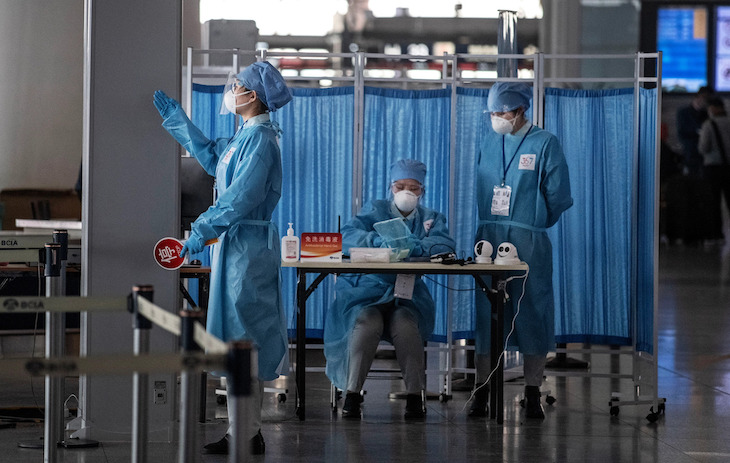What’s the point in asking people flying in from China to present a negative Covid test? Rishi Sunak has stepped in to order this, but he hasn’t quite explained why this is necessary or how it would help. Covid is still widespread worldwide but British resistance (through exposure and vaccination) is such that the virus is not seen as a threat to the NHS (collapsing for other reasons) or public health.
Data in Singapore from travellers in China confirms Beijing’s evidence that the variants it’s dealing with are BA.5.2 and BF.7 which have been in the UK for months. They can cause mayhem in an unexposed, badly-vaccinated country like China – but not to us. There’s no reason, yet, to suspect the Chinese are hiding a dodgy variant and if they were, the rest of Asia would find out quickly. So why, even in theory, would it be a problem if people flew in from China or anywhere else with a virus that is now ubiquitous?
Demanding a negative test to those coming in from China is pretty low on a travel disruption scale that, once, went up to two weeks confinement in a hotel. But this matters because it’s a sign of how a Sunak government would work, and how evidence-based he will be. How different he’d be from Boris Johnson when faced with a panic.
As Chancellor, he was an advocate of evidence-based policy and a big critic of measures that were not backed up by science. But as Prime Minister he’s doing what Johnson did: moving because others are. Lining up behind the US (which still denies entry to the unvaccinated). And not providing any evidence to back up his claim that travel measures are necessary. This is a bit of a disappointment to those (like Mark Harper, the Transport Secretary) who had hoped Britain would follow Germany, Austria and other countries who say there’s no evidence to suggest that any extra measures need to be imposed upon the Chinese.
Now, perhaps Sunak knows something we don’t. Mutations, of course, occur with every replication of the RNA in body cells. Perhaps there are genuine fears that China has incubated a variant that Brits are vulnerable to. But that would run contrary to the general worldwide direction of Covid. The most recent variants that emerged from Omicron (BA.5, BQ.1, BA.2.75 and XBB) did spread faster but did not have fundamentally different properties. Even if a dodgy variant did emerge in China, it’s unlikely to stay confined there by a travel ban. World travel patterns show that new viruses do spread pretty quickly. If one route is blocked, they’ll find another.
I’d like to close by quoting Professor Andrew Pollard, chairman of the UK joint committee on vaccination and immunisation, speaking to BBC Radio 4:
Trying to ban a virus by adjusting what we do with travel has already been shown not to work very well. We have seen that with the bans on travel from various countries during the pandemic. The likelihood of variants emerging there is the same as it is in other places where there are Covid waves. And the variants that emerge in China are ones that are going to be best adapted to spread in a Chinese population, which compared with countries like the UK is much less Covid-experienced… Testing people travelling from China probably doesn’t really answer the question about whether any new variant that is detected is going to be a problem here.
Where is Professor Pollard wrong? If he is wrong, by all means let’s reach for the restriction lever. But if Sunak is imposing restrictions on travellers without evidence then let’s at least be clear that we’re snapping back into the pattern of ‘precautionary principle’ behaviour that got us into so much trouble in the first place.







Comments